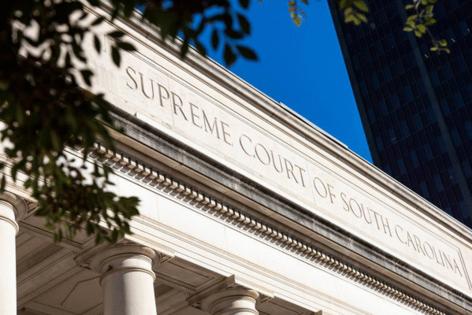Republicans admit gerrymandering. South Carolina Supreme Court weighs if that's allowed
Published in News & Features
COLUMBIA, S.C. — Two years ago the U.S. Supreme Court upheld South Carolina’s new congressional maps, rejecting claims that they were racially biased. Now, the state Supreme Court will weigh whether those maps, drawn explicitly to weaken the Democratic vote, violate the state Constitution because they’re too partisan.
In 2023, the U.S. Supreme Court sided with South Carolina’s Republican leadership, who argued that the maps drawn in 2021 were not intended to dilute Black votes, merely Democratic ones.
But a new suit brought by the League of Women Voters, a national nonpartisan organization, argues that the state constitution should prevent maps from being drawn in an overtly partisan manner.
“You cannot intentionally dilute a group of voters in a way to affect their electoral opportunities,” said Allen Chaney, legal director at the American Civil Liberties Union of South Carolina, who represented the League.
Their argument is based on a clause in the state constitution that guarantees every South Carolina resident “an equal right to elect officers and be elected to fill public office.” Courts in New Mexico, Kentucky and Pennsylvania have ruled that similar language in their state constitutions prohibit overly-partisan gerrymandering.
After a suit was brought by the NAACP against the redrawn maps in 2021, state Republicans denied allegations that they made the district more Republican by moving Black voters out of the district. Instead, the Republicans admitted, they targeted Democrats.
Will Roberts, the lead cartographer for the Senate Republicans, testified he was “one hundred percent” focused on creating a more favorable Republican district when drawing the map in 2021. Senate Majority Leader Shane Massey testified at trial that partisanship was “one of the most important factors.”
The 2021 district maps were the first ones drawn after the U.S. Supreme Court ended a civil rights-era requirement that South Carolina submit congressional maps for federal pre-approval.
While gerrymandering, or the redrawing of electoral boundaries to favor one party or the other, is a built-in part of the country’s political system, the 2021 maps go too far, lawyers from the ACLU argued. In essence, they have deprived voters in a competitive district the opportunity to have a meaningful impact in an election.
The ACLU wants the Supreme Court to halt congressional elections until the state’s General Assembly draws maps that are more fair. The next congressional elections are scheduled for November 2026.
“I don’t think the court can reward lawmakers here for figuring out how to accomplish the same effect with sophisticated and nuanced means,” Chaney told the Supreme Court.
The lawsuits have focused on the the 1st Congressional District in the Lowcountry, where the impact of gerrymandering is most clearly seen. The district was redrawn to shift people who voted for President Joe Biden in 2020 into the neighboring 6th Congressional District, a safe Democratic seat occupied by U.S. Rep. James Clyburn of Columbia.
The 1st Congressional District seat is currently held by Nancy Mace, a Republican who won her 2020 race by just 1% of the vote. After the congressional map was redrawn, Mace won reelection in 2022 by roughly 14% and again in 2024 by almost 17%.
The redrawn plan moved 53,000 people from the 6th Congressional District into the 1st. About 140,000 people, including more than 30,000 Black voters, were then moved from the 1st Congressional District into the 6th, which runs from North Charleston to Richland County, according to court filings. The process, known as packing, concentrates voters of one party in a district, lessening the impact they can have elsewhere.
The realities of “political geography” mean that not every voter can expect to see their chosen candidate be elected, Chaney said. But there’s a big difference between being a Democratic voter in Oconee County, where more than 75% of voters cast ballots for Donald Trump in 2024, and a Democratic voter in politically diverse Charleston County.
Lawyers for the state’s Republican leadership, who redrew the maps, offered a range of arguments to defend their position.
Grayson Lambert, representing Gov. Henry McMaster, a Republican, argued that the original drafters of the state constitution had never intended for it to prevent partisan gerrymandering. A review of contemporary records, like newspapers, from the time the constitution was drafted 130 years ago found no discussion of partisan gerrymandering.
“It would be inconceivable that no one put forward that argument” if that’s what the constitution intended to prevent, Lambert argued.
John Moore, a lawyer for Senate President Thomas Alexander, R-Oconee, argued that the constitution simply “protects every voter’s right to cast a ballot and have that ballot counted.”
It is impossible to remove politics from redistricting, Moore said. He argued that the electoral process provided sufficient checks and balances to reapportionment without the court having to act as a referee. If voters didn’t like how politicians were redrawing district maps, they should vote them out, Moore argued.
“The court should decline to wade into this political thicket,” Moore said.
Andrew Matthias, representing House Speaker Murrell Smith, appeared to take it a step further, telling Chief Justice John Kittredge that the court actually had no authority to review the General Assembly’s redistricting plans.
While it is unclear whether justices will accept that they have no role to play, they appeared wary of wading into the challenges of redistricting without a clear standard to follow.
“There has to be a guideline. It can’t just be what my gut says, or your gut or someone else’s,” said Chief Justice John Kittredge.
Urging the judge’s to take up the issue, Chaney said that the right for a citizen of South Carolina to have their vote matter was not a partisan issue. “We would be here making the argument if it was Democratic gerrymandering.”
©2025 The State. Visit at thestate.com. Distributed by Tribune Content Agency, LLC.







Comments